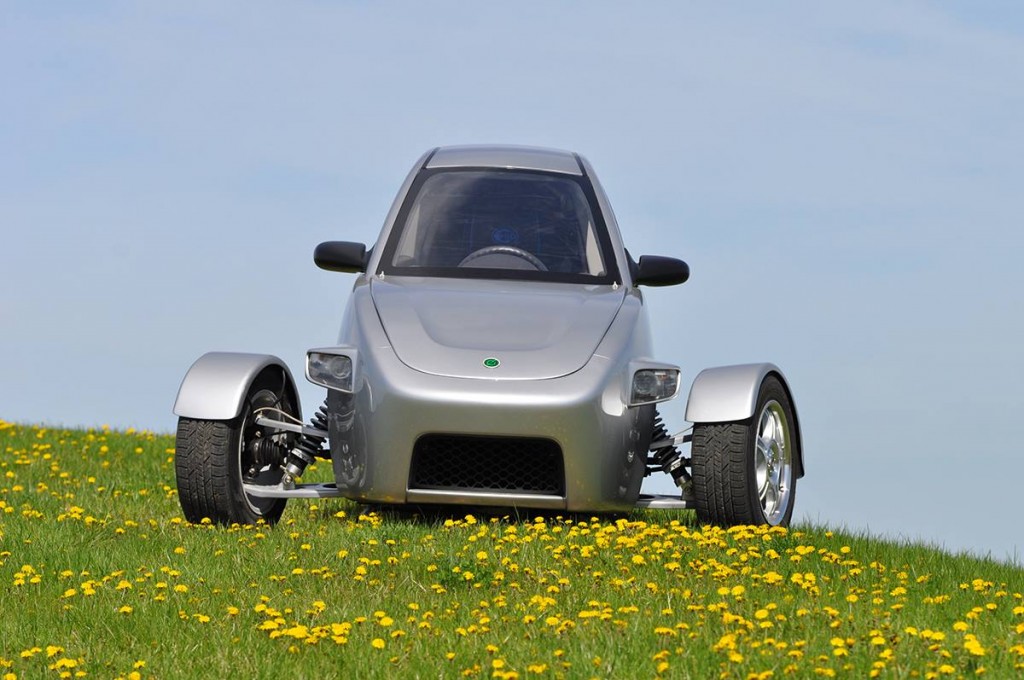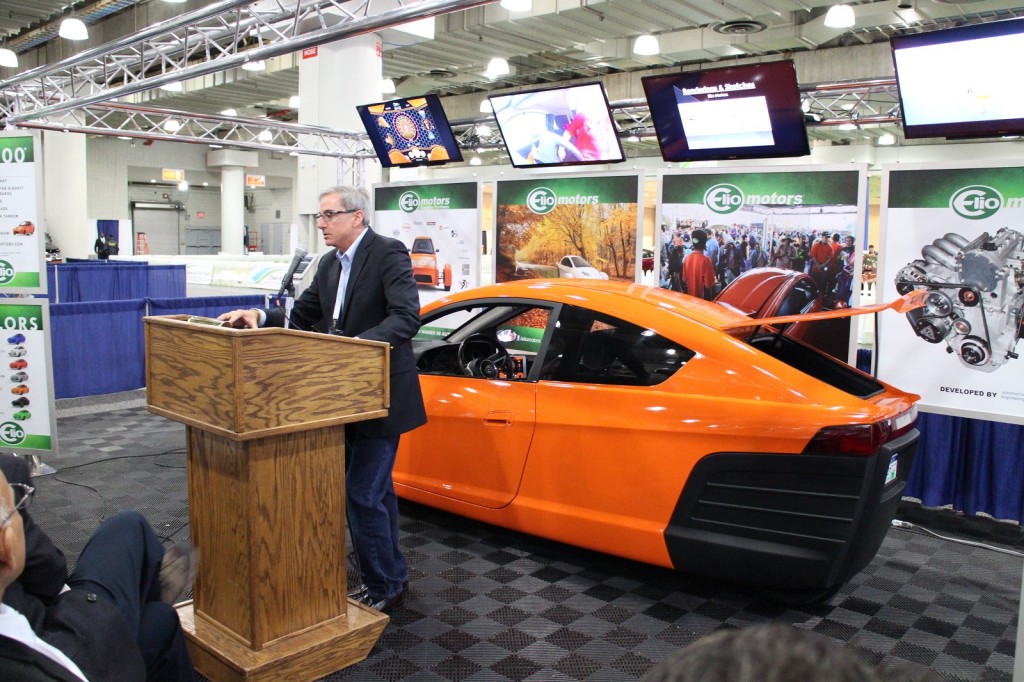Last week Elio Motors put a price on a 150-mile, fully electric version of its high-efficiency, three-wheeled car: $14,900.
That’s a different format—and price—than the original Elio, which still hasn’t arrived 12 years after its original announcement and 9 years after its originally anticipated arrival date. Call the company a startup only in the sense that there hasn’t yet been a product delivery.
Since its 2009 inception Elio has been slowly working on the same single product—a three-wheeled vehicle powered by a gasoline engine, with the original plan to sell it for just $6,800, with a projected 84-mpg EPA-cycle fuel economy. By later this past decade, it was supposed to cost less than $8,000 and return more than 80 mpg.

Elio Motors 84 mpg 3-wheeler (Image: Elio Motors)
Elio’s plan to go electric—something founder Paul Elio had repeatedly resisted over the years—was made clear in its 2020 Annual Report filed with the SEC last week, followed up with a press release. The company now says that it plans to put the gasoline model, called Elio-G, on hold in favor of the Elio-E—but that it does still plan to build the Elio-G.
The company claims that the Elio-E can go 110 mph, versus “over 100 mph” for the Elio-G. While the gasoline model had a projected 672-mile range from its 8-gallon tank, the electric model will return 150 miles from a battery pack not yet detailed.
![Elio Motors 84 mpg 3-wheeler [Image: Elio Motors] Elio Motors 84 mpg 3-wheeler [Image: Elio Motors]](https://images.hgmsites.net/lrg/elio-motors-84-mpg-3-wheeler-image-elio-motors_100477634_l.jpg)
Elio Motors 84 mpg 3-wheeler [Image: Elio Motors]
There are two models the Elio would compete against—both three-wheelers. Aptera, reborn in Southern California last year, is seeking to bring its “never charge” solar car within the next year, at a $25,900 base price. And then there’s the ElectraMeccanica Solo, an $18,500 single-seater EV that, after some delays, is being initially offered in Arizona, California, and Oregon.
Elio previously boasted that it was the first startup vehicle manufacturer in 60 years to build its own internal combustion engine—a stretch, as the company later admitted it was a modified version of the Suzuki 3-cylinder last offered in the U.S. in the Geo Metro. It abandoned that plan and signed on with Roush for engine supply in 2018.
It appears that the relationship with Roush might continue with the Elio-E. In the financial filing it wrote: “Elio has contacted Roush (one of Elio Motors engineering providers) and their assessment was that the current design could be electrified utilizing a significant portion of the engineering and development (including approximately $40,000,000) that has already occurred.”

Elio Motors founder Paul Elio at New York Auto Show press conference, Apr 2015
Elio continues to operate despite a mind-boggling deficit. In 2020 alone it reported a loss of $18.0 million, bringing the company’s accumulated deficit to $215.8 million.
The company is registered in Delaware, but its headquarters are in Phoenix, Arizona, at what is clearly stated in financial filings is “an executive suite leased on a month-to-month basis.” Elio still claims that it will assemble its vehicles at a former GM plant in Shreveport, Louisiana.
Elio’s timeline for the arrival of its product has seemingly shifted as rapidly as the horizon. It had originally been announced that production was planned for Shreveport around 2014. A first test-worthy prototype was built in 2016. By 2017, when the car still hadn’t arrived, he was promising 2019 at the earliest. In the company's 2019 financial filing, Elio stated that it did not expect to start delivering vehicles to customers until 2023.
![Elio Motors 84 mpg 3-wheeler [Image: Elio Motors] Elio Motors 84 mpg 3-wheeler [Image: Elio Motors]](https://images.hgmsites.net/lrg/elio-motors-84-mpg-3-wheeler-image-elio-motors_100427025_l.jpg)
Elio Motors 84 mpg 3-wheeler [Image: Elio Motors]
The company has made many promises over the years and generally speaking, has failed to deliver on most of them. Elio previously promised that it would employ 1,500 American workers by 2015—something Elio again reiterated in 2019, with a pledge of 90 percent North American content.
Elio is a cautionary tale among automotive startups, even before bringing today’s long queue of electric-vehicle startup SPACs into the conversation. It claimed to be the first equity crowdfunded company to publicly list its shares, and in the early days of trading in 2016 it blipped past a $1 billion valuation—sinking to a very small fraction of that in recent years.
In 2017, the Louisiana Motor Vehicle Commission found Elio to be operating as both a manufacturer and a dealer without a license. The commission also ordered Elio to place refundable reservations into a separate account—something the company might not have been doing until then.
![Elio Motors 84 mpg 3-wheeler [Image: Elio Motors] Elio Motors 84 mpg 3-wheeler [Image: Elio Motors]](https://images.hgmsites.net/lrg/elio-motors-84-mpg-3-wheeler-image-elio-motors_100414288_l.jpg)
Elio Motors 84 mpg 3-wheeler [Image: Elio Motors]
Then in 2018, after that and continued delays, Elio sold about $2.5 million of the company’s stock to Overstock.com, to help pay off the company’s mounting debt, and revealed a cryptocurrency called ElioCoin that it said would help bring the car to market.
Elio stopped sending out regular weekly e-mail updates in November 2019, and prior to the Elio-E announcement it took down its previous blog and updates. Now it’s added a page about fleets that positions the Elio-E as a solution for the service and small delivery industry—a market that Arcimoto has gained some traction with. That page seems to suggest relationships with Grubhub, DoorDash, Geek Squad, Amazon, and others.
It’s noteworthy that Elio isn’t giving a projected arrival date for the EV. Will Elio deliver this time? This decade? Leave your comments below.
"motors" - Google News
September 13, 2021 at 10:00PM
https://ift.tt/3z71k8V
Elio Motors pivots to 150-mile Elio-E EV, gasoline version still not canceled - Green Car Reports
"motors" - Google News
https://ift.tt/2SwmEC9
https://ift.tt/3b0YXrX
Bagikan Berita Ini















0 Response to "Elio Motors pivots to 150-mile Elio-E EV, gasoline version still not canceled - Green Car Reports"
Post a Comment